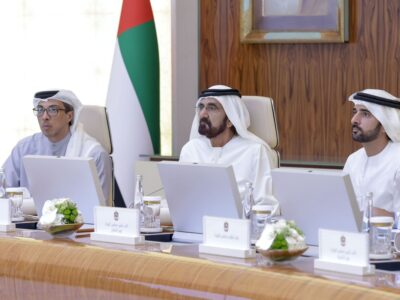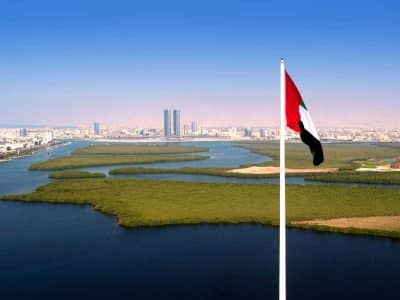Climate diplomacy between the United States, the UAE and other countries in the Arabian Gulf can translate into tangible results, according to officials from the US and the region.
Last week, the UAE and the US, with the support of countries including the UK, Brazil, Denmark, Israel, Singapore and Australia, announced the launch of the Agriculture Innovation Mission for Climate (AIM for Climate), an initiative aimed at increasing and accelerating global agricultural innovation and R&D over the coming five years in a bid to combat global climate change.
The event will be officially launched at COP26 in Scotland later this year.
Among those who have hailed the effort is US climate envoy and former Secretary of State John Kerry, who said he was “impressed by the ingenuity being applied to food and climate challenges during my recent trip to the UAE.”
“[We] know that we all stand to benefit by sharing best practices and raising innovation ambition when it comes to climate-smart agriculture,” he added.
 US climate envoy and former Secretary of State John Kerry
US climate envoy and former Secretary of State John Kerry
In a statement, the State Department said that by the time of COP26, AIM for Climate will demonstrate “collective commitment” to invest in agricultural innovation, as well as outline a framework to discuss and promote priorities and “identify chief scientists as key focal points for international cooperation on climate-related agricultural R&D.”
In an event organised by the Washington DC-based Atlantic Council last week, Sultan Al Jaber, UAE Minister of State and ADNOC CEO said that he believes that climate diplomacy “can turn climate action into real, true, meaningful [and] tangible results.”
In a statement following Kerry’s visit to the UAE, Al Jaber added that “it was clear that our region is indeed very much keen, interested and committed to playing a responsible role in helping advance the global agenda in addressing the climate challenge.”
Middle East experts at Washington think tanks have noted that the region faces a number of unique and pressing challenges that require collaboration to address.
 Sultan Al Jaber, UAE Minister of State and ADNOC CEO
Sultan Al Jaber, UAE Minister of State and ADNOC CEO
“The Middle East is the most water-stressed region on earth,” Arab Gulf States Institute of Washington non-resident fellow Aisha Al-Sarihi wrote in a new report. “Rising temperatures and extended periods of drought, combined with growing populations, socioeconomic development and urbanisation, put further pressure on scare water resources, posing serious threats to lives.”
In this setting, Al-Sarihi noted that Middle Eastern countries should do more to come together to address these issues.
“Climate change impacts are likely to be felt across borders, and if not properly managed, this could lead to conflicts or insecurity,” she wrote. “Addressing climate challenges should therefore involve transboundary responses.”
“Given their differences in income and development, Middle East countries can take advantage of regional governance and cooperation, especially in the areas of policy coordination and agenda setting, research and knowledge and information sharing, technical assistance and capacity building, and leveraging finance.”
 Arab Gulf States Institute of Washington non-resident fellow Aisha Al-Sarihi
Arab Gulf States Institute of Washington non-resident fellow Aisha Al-Sarihi
Another expert, American University in Cairo associate professor Khaled Tarabieh, said that the potential impact of climate change on Middle East urban areas – such as air quality – require “swifter steps” to reach solutions, particularly in a post-pandemic environment.
“Understanding that the possibilities of a flip to pre-Covid-19 conditions are less likely, more efforts are thus needed to implement new models of co-existence,” he wrote in a piece for the Middle East Institute. “Accordingly, there is a need for innovation and global collaboration. Governments should seek the best practices and allow periods of experimentation and analysis within a new framework for city resilience.”
Additionally, experts have warned that climate change and resultant air pollution pose a threat to the region’s economic development. A recent report from the Middle East Institute noted that air pollution alone is estimated to have cost the MENA region around 2.2 percent of its GDP, totalling some $80 billion in 2019.
 American University in Cairo associate professor Khaled Tarabieh
American University in Cairo associate professor Khaled Tarabieh
“Environmental sustainability can no longer be an afterthought when it comes to investment and policy,” the report noted. “Rather, it should be an indispensable part of any such decisions.”
“It is long overdue for policymakers, business leaders and consumers in the MENA region to acknowledge the fact that environmental sustainability is a necessary – but not sufficient – requirement for the region’s inclusive long-run and stable growth.”
Aside from the UAE and Saudi Arabia, other nations in the Gulf have also expressed a willingness to work with their counterparts abroad to address issues caused by environmental change.
At a recent event organised by the Arab Gulf States Institute, for example, Bahraini Special Envoy for Climate Affairs said that Bahrain is “working closely with the US government.”
 Bahraini Special Envoy for Climate Affairs Mohamed bin Mubarak Bin Daina
Bahraini Special Envoy for Climate Affairs Mohamed bin Mubarak Bin Daina
“We’re in the process of having a workshop with the US government and the region [that will] address the technical issues we do have and how to resolve them,” he said.
“They’re doing a great job getting everybody on board,” bin Daina added. “You need everybody in the world on board to agree on these goals.”







